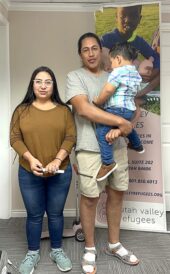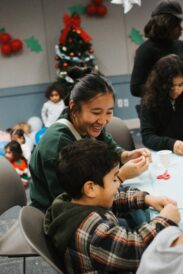Making a Difference: Local volunteers helping refugees succeed in Utah
- A group of refugees stands with Leonard Bagalwa, founder of Utah Valley Refugees. The organization helps refugees acclimate to their new life in Utah.
- A family of refugees is shown that has been helped through the efforts of Utah Valley Refugees.
From child soldier in the Democratic Republic of the Congo to refugee, Leonard Bagalwa has had a challenging life. After landing in Salt Lake City, he was moved to Payson where he learned how to milk cows. Then, he decided to go to Utah Valley State College.
“I didn’t have a high school diploma. When I left the DRC, I lost everything,” Leonard said. “After failing nine times before I passed, I earned a BA in public health and an MBA in business.”
Best’s parents sent her to Utah to attend school because that’s where they felt she needed to go. To Best, Utah was too cold and too far away from her home in Nigeria. “On my first day at Utah Valley University, they gave me a map. We don’t use maps in Africa, so what was I supposed to do with the map? she said. “I couldn’t find any of my classes, so I gave up.” For the next week or two, she went to school but sat in the Hall of Flags and read.
Every time Leonard passed through the Hall of Flags, he noticed a young woman sitting on a bench there. He discovered her name was Best from Nigeria and asked her why she was sitting there. Her answer shocked him, “I have classes, but I have no idea where they are.”
Each day, Leonard helped her find her classes until she knew where to go. Being friends turned into marriage and five children, two boys and three girls. Ultimately, that shy young woman left the Hall of Flags and earned a bachelor’s degree in psychology with a minor in social work and will begin an MPA program at Brigham Young University in the fall.
Leonard bounced from one foster care home to another. As an adult, he worked for the State of Utah, helping refugees and migrants obtain access to healthcare. While working with refugees, Leonard discovered that the problems and challenges he experienced as a refugee were the same ones refugees still face today. “I knew I needed to do something different. The problems and challenges were the same,” he said. “Surely, I could do better for others.”
Leonard and Best began talking to other refugees and asking simple yet important questions about what they were going through, why they weren’t in school, why they didn’t have a job and why they still weren’t making ends meet.
Thus, Utah Valley Refugees began in 2016 in the basement of their home. “Once we knew the reasons why they were not doing well, we could develop real solutions to help them,” Best said. “Our mission is simple: assist refugees in their quest to become self-reliant so they can find affordable housing, learn English, receive cultural training, obtain job training and education, find legal aid, and access medical assistance.”
Refugees come as individuals and families from many countries like Haiti, Afghanistan, Ukraine, Russia, Venezuela, Colombia, the Democratic Republic of the Congo, the Republic of the Congo, Rwanda, Uganda, Cuba, Kenya, Angola, Brazil, Peru and Nicaragua.
One challenge refugees experience is they do not choose where they will be resettled. They are assigned a place and go there. When refugees are resettled, they receive benefits for only 90 days. Once the refugees complete their 90 days, Utah Valley Refugees enters the picture because many people still need additional help with language and other circumstances.
Best is passionate about helping but knows challenges arise, particularly when it comes to culture. “We are from different countries with many cultures,” Best said. “But I tell them that we are one. If they have any conflicts with any person or culture here, they need to keep it out. We need to be united in everything we do.”
Utah Valley Refugees loves and needs volunteers. “We receive lots of phone calls from community members wanting to be part of something big and ask how they can help,” Best said. “We connect them with refugee families and help them become a part of the sponsor’s family.”
The volunteers who help refugees are invaluable to them. Part of the organization’s success stems from Family Alliances, through which a group of five to seven families from the community are matched with a refugee family. These community members become a second family to the refugee family and mentor them, provide financing for housing and make them feel welcome in the community.
Robert Cvetko, a HealthEquity corporate developer and chair of the Utah Valley Refugees Board of Directors, initially became a volunteer after his daughter began volunteering for Utah Valley Refugees. She told him they needed volunteers, and he signed up. “I became part of a refugee Family Alliance,” Cvetko said. “Our family’s sponsoring a refugee family was really rewarding. We feel it is important to get everyone involved in welcoming and caring for refugees.”
Funding is always a challenge. They receive funding from the State of Utah and the Governor’s Office. They also received private funding in addition to state funding to purchase a duplex. Many donors and families have stepped up and helped.
School is a priority for the refugees, both for the children and the parents. Many come with varying skills sets, including degrees from their home country. English is a challenge for most refugees. Mentors help with one-on-one training. In-school help is implemented during school for the children. After-school programs help children catch up.
“We have great partnerships with all school districts in Utah County, including Provo School District. The school districts have family advocates,” Best said. “We match families with the teacher, so they know who to connect with. These advocates help with any communication issues from the schools or the teachers.”
Since 2016, Utah Valley Refugees has served 250 refugees in some capacity. Currently, they are serving 160 refugees. Still, many needs exist. “Some of our biggest needs,” Best said, “continue to be affordable housing and sustainable employment. It’s all about access to enough resources.”
One refugee is Nora, a mother of five children from Nigeria who landed in Salt Lake City. She met Leonard and was reassigned to Utah Valley Refugees. “I have seen fantastic growth in my life and my children’s lives,” Nora said. “If it were not for Best and Leonard, I would not have been able to buy my home and find a full-time job. When they need help in the office, I just go help them.”
Best’s insights are poignant. “Refugees come to this country and are allowed to work. They are legal, pay taxes and contribute to the U.S. economy,” Best said. “We need to treat them with some dignity. Doing simple things may be a challenge for them like initially taking a bus or using a microwave.”
Utah Valley Refugees feels they have made a difference in the lives of refugees. “One difference is showing the people happiness,” Best said. “When you receive them for the first time, they have almost given up. Many have low self-esteem, thinking it is too late for them, especially the older folks. Our role is to teach them, no matter what they have been through. The key is showing them that happiness and hope are attainable.”
Much work is done within the organization to help people succeed. “When we receive these people, they are broken. Within time, the refugees become self-reliant and graduate from the program,” Best said. “Many have become homeowners, joined the U.S. army, obtained jobs and become American citizens. Success, though, is individual.”
Challenges still exist. Some employers feel uncomfortable employing refugees. “Employers need to know refugees are legal to work in the United States,” Best said. “We invite companies and others to please consider refugees so there will not be employment and housing barriers.”
Often, hindsight shows us things we wish we would have known before beginning anything. “I wish I had known the emotion it takes out of a person,” Best said. “We hear stories about unimaginable things in their lives. You can do so much to help them overcome or even comfort them. I don’t like people suffering. It traumatizes me.”
Working with refugees causes a new sense of discovery. “Refugees are humans just like you and me,” Best said. “One of the differences is that they have been displaced and have suffered much trauma. They require a lot of grace from us. We have to be patient and give them a second chance.”
Best and Leonard are grateful for what has been done. “We thank all who have helped a refugee family in any way,” Best said. “We have met many good Americans who are generous, kind, empathetic and willing to help. It is a privilege to work with good people. We need more of you to teach refugees and give them second chances.”
To volunteer for or donate to Utah Valley Refugees, send an email info@utahvalleyrefugees.org, call 801-850-6013 or drop by its location at 125 E. 300 South in Provo.






